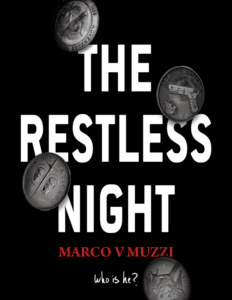Writing to Deal with Grief
– by Marco Muzzi – February 21, 2019
The Memory
I’m a boy.
I take tentative, soundless steps across the oak floor towards him. My muscles feel limp. My gaze finds everything – the blue armchair he’s seated in, the warm rays of afternoon sun rushing through the bay window, the picture of my family hanging to his left – just not his eyes. But I feel them on me.
I stop inches from my grandfather, my eyes stuck to the floor. My face puckers – the sour smell of the hospital hangs from his grey, wrinkled housecoat. My mother’s gentle touch finds my shoulder.
“It’s OK.” Her voice is soft. My body shudders hard.
“Do I have to?” I whisper into her jeans.
“Just one kiss.” She likely knew it might be the last.
My gaze crawls upwards until our green eyes meet. His smile – undeterred by the cancer lurking beneath the jaundice, liver-spotted skin of his sunken face – beams at me.
I don’t recall a single conversation with him, but I remember what he told me with his eyes that day.
The yearning.
The hope.
The fear.
My pale, round face moves towards his cheek.
To this day, I still feel the sharpness of his stubble against my lips.
I don’t remember his funeral, or how I insisted on placing a toy inside his coffin. But I remember when thieves broke in to his house years later and stole his coin collection; I especially recall how they were never caught.
And so, all these years later, I’ve written my novel, The Restless Night, in honour of my grandfather.
A crime-thriller, yes. But also a case study in grief.
The Process
This story began as a cold-case-murder-plot set in my hometown of Sault Ste. Marie, Ontario. However, as I began building the character backstories I realized I was also penning a commentary on how we deal with grief.
Each character is thusly made to experience loss, and by design, each handles it differently. They are, to a much, much more extreme degree, mirrors of my own failed attempts at handling the grief I felt. For effect, the book is divided in to 5 parts, with each named after a stage of the grieving process: Isolation. Anger. Bargaining. Depression. Acceptance.
I feel lucky to have found writing. Specifically, writing this novel – albeit a fictional tale – helped me feel closer to a man I hardly knew. Crafting the opening scene, in which the main character is retelling a recurring dream wherein he relives the discovery of his grandfather’s murder, was exceptionally therapeutic. In building those moments, I was able to express feelings I had long repressed. Thoughts I was too embarrassed to say aloud. But thoughts I needed to set free.
Outlining the overarching plot-line to this series of books, which focused on the unsolved crime of who stole my grandfather’s coins, helped me achieve a degree of closure, as well as answer a question that had lingered in my mind for years:
Would he be proud of me?
As such, I encourage all who have experienced loss to grab a pen and some blank paper, and write down how you feel. You might just lift a weight from your chest and maybe even write a bestseller.
If you want to read a copy of my book, The Restless Night, you can find it on Amazon and anywhere books are sold online.
About the Author – Marco Muzzi
Ad Man by day, writer by night, Marco Muzzi’s chosen literary passions include writing fictitious tales of crime and mystery, as well as non-fiction regarding matters of the heart. His industry-focused publications lay within the pages of Profit Magazine, Adweek, iMedia Online, and Techvibes. Originally from Sault Ste. Marie, Ontario, Marco Muzzi now calls Kitchener, Ontario, home.
–
